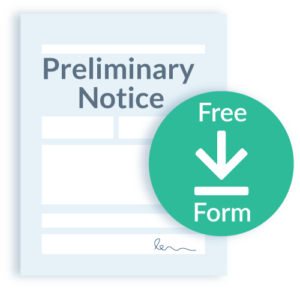Private projects
General contractors are not required to send notice on private projects.
However, preliminary notices increase communication on the job, and they can speed up the payment process after the project ends.
General contractors are not required to send notice on private projects.
However, preliminary notices increase communication on the job, and they can speed up the payment process after the project ends.
General contractors are not required to send notice on public projects.
Since GCs will not make a claim against their own bond for non-payment, they do not have bond claim rights, and have no preliminary notice requirement.
Subcontractors and suppliers are not required to send preliminary notice on private projects.
However, sending a preliminary notice no matter what improves communication and contributes to a speedier payment process.
Subcontractors and suppliers are not required to send preliminary notice on public projects.
However, sending a preliminary notice no matter what improves communication and contributes to a speedier payment process.
Preliminary Notice is not required by West Virginia lien law. However, any party may provide the property owner with preliminary notice in an effort to facilitate payment.
If sent, the preliminary notice should be provided prior to the furnishing of labor and/or materials.
This is an optional notice, so there is no consequence for sending the notice late.
There is no specific provision as to how this notice must be sent, but certified mail is sufficient.
Nope!
Notices sent by certified or registered mail are considered delivered when sent.
It depends. West Virginia does not require any preliminary notice to preserve the ability to make a bond claim, however, it is not clear if any notice requirements contained within the language of the bond itself control. It may be best practice, then, to obtain a copy of the bond to determine if there are any notice requirements, and to comply if there are.
N/A
N/A
N/A
N/A
First, filing a lien under the circumstances you present is problematic. There are strict deadlines for noticing intent and recording your lien. Sounds to me like this is an afterthought and not within 4 months of your last date of work, but perhaps I'm wrong there. In any event, if you're seeking items from two years ago, I doubt that would go well for you under a mechanic's lien theory of recovery.
Second, it doesn't sound like there was much of an arrangement between you and the owner, this was something you were doing to improve the residence you were living in.
Third, if you're broke, what good is the mechanic's lien anyway? Even if it were valid, you'd still need to take action on it to pursue it. If they've just refi'd, I imagine the property is encumbered to a not-insignificant extent. The loan already closed, so presumably they aren't going to refi again or sell very soon. If you don't have the money to pursue a wrongful eviction, foreclosure likely isn't within your current financial ability to pursue. If you aren't going to foreclose, then you still have other claims and remedies, but I'd think you'd handle most of those claims and damages within a wrongful eviction case, should you ever have the means to pursue that case.
Most likely your best course of action at this point would be a demand letter and potentially a breach of contract action against the GC who has not paid you. If there is a payment bond on the project your may still have time to make a claim against this bond. But otherwise, because you did not send preliminary notice, you would not have lien rights.
West Virginia is another of the very rare states that has no preliminary notice requirements for any party on any project.
While there may be no specific requirements to provide a preliminary notice in West Virginia, that doesn’t mean that providing prelianry notice is a bad idea. In fact, providing preliminary notice, even when not required, is usually the smart thing to do. Providing a voluntary preliminary notice document, provided it’s drafted and formulated correctly, can be beneficial by promoting project visibility, providing helpful information, opening channels for communication, and streamlining payment.
The above are just some of the many reasons to provide voluntary preliminary notices, or as we like to call them at Levelset, “visibility documents” but, in fact, there are many more reasons, as well.

First, download the free generic preliminary notice form. The generic form is valid in West Virginia, and all other states that don’t require a preliminary notice. The form provides the GC, owner, and other parties in charge of payment with useful information about your company.

Make sure all the information you include in your preliminary notice form is correct and accurate. That’s because paying parties often rely on the form to communicate with you, and mistakes when preparing your form could lead to payment difficulties down the line.

Since West Virginia doesn’t require preliminary notices, there are no requirements for delivery. Send your preliminary notice however you see fit.
Select Preliminary Notice document.
Provide basic job information.
Levelset sends the document for you. Postage included!